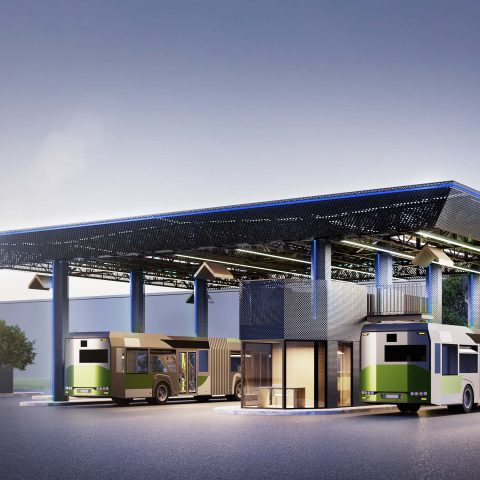Solaris to launch a Charging Park for testing e-buses at its plant in Bolechowo
An innovative charging station and parking is being built by Solaris at its premises in Bolechowo near Poznań. Named Solaris Charging Park, it features different charging systems and with bidirectional power flow capability. The possibility it will provide to test a variety of solutions will allow Solaris to respond precisely to the growing demand for electric buses from European operators, the bus builder says. […]

An innovative charging station and parking is being built by Solaris at its premises in Bolechowo near Poznań. Named Solaris Charging Park, it features different charging systems and with bidirectional power flow capability. The possibility it will provide to test a variety of solutions will allow Solaris to respond precisely to the growing demand for electric buses from European operators, the bus builder says. The Charging Park will open for use in the first half of 2022.
In 2021 Solaris delivered several hundred e-buses to almost 30 towns and cities across Europe. It is zero-emission vehicles that are the sales priority of the company and year by year they are accounting for an ever larger share of orders fulfilled by the producer. Investment in its own Charging Park – i.e. a single central site for charging e-buses – marks a natural step in the dynamic development of Solaris’s zero-emission range.
The entire Charging Park will cover an area of 5,000 m2. In its roofed part there will be 4 stands for vehicles, the main charger and a technical room. Photovoltaic panels will be installed on the roof of the structure to enable energy to be generated locally from renewable sources. Plug-in charging islands will be located right next to it. The new space will become a place where all loading / unloading processes as well as tests of new technologies and functionalities will take place. Moreover, the Charging Park will also serve clients by showcasing innovative solutions for them to see.
Three suppliers of charging systems at Solaris Charging Park
The Charging Park will feature charging systems made by three different suppliers. This will allow various battery charging modes to be tested and thus provide offerings tailored to different market needs. The first solution is a charger with eight charging points (with a power output ranging from 150 kW to 600 kW) that can charge three vehicles at the same time. The system is compatible with all connectors available on the market and can connect to both buses and trolleybuses. It also supports the Vehicle-to-Grid (V2G) functionality, i.e. bidirectional energy flow between vehicles and the grid. Solaris Charging Park will be the first bidirectional charging park in Poland and one of the first innovative sites of its kind in Europe. The deployment of V2G technology is a complete novelty, one which will make it possible to discharge buses for test purposes and to use vehicles as mobile energy storage facilities.
The charging site will also boast a charger with four charging points with a total power output of 300 kW. It will feature two socket outlets as well as one conventional and one inverted pantograph. What is more, two independent plug-in chargers with a power output of 150 kW each and V2G capability will also be installed. A central management system will allow the operation of the Charging Park to be monitored and remotely controlled.
The construction work is slated to be completed by the end of this year and the Park will be fully operational by mid-2022.








